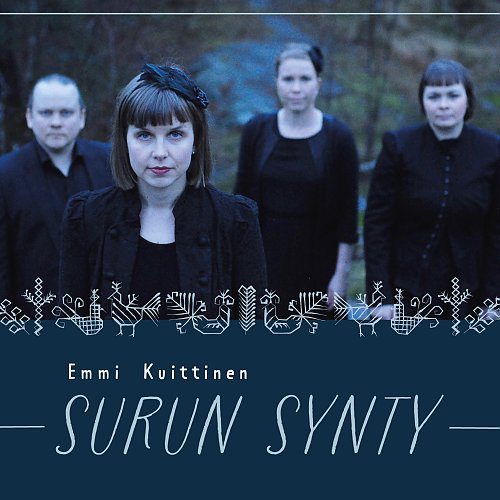
© Juha Olkkonen
Surun synty (Sorrow’s Birth) is Emmi Kuittinen’s new album. She sings and plays together with Antti Rask (vocals, ukulele, cello), Mimmi Laaksonen (wind instruments, harmonium, vocals) and Kirsi Vinkki (fiddle, jouhikko/bowed lyra and vocals).
Emmi released her last album Itken ja laulan (I weep and sing) together with Ikuisen ikävän orkesteri (Orchestra of Eternal Longing) in 2020. In that album she observed the Karelian and Ingrian lament tradition from a musician’s perspective. On the new album she deals with the theme sorrow more widely. In her music can be heard layers all the way from the old runosongs and laments to more modern songs and schlagers. Beside Emmi’s own compositions and lyrics there is material from Karelia, Ingria, Finland and Sweden. ”I wanted to explore the nature of sorrow in music and what different kinds of sounds melancholy has”, Emmi tells about the album.
In the title song of the album Emmi asks where the sorrow was born. In the Karelian and Finnish charm tradition it is important to know the birth or the origin of the ailment. This knowledge gives the power to then rule it. If the sorrow’s birth is known, maybe also the sorrow goes away or at least changes.
The album starts with the song Hyvä ol (It Was Good) where you still remember the happy old days as a young person. The second piece Kuin muistuu mieleheni (When I Remember) is a broadside from the 19th century and has been in Emmi’s repertoire for many years. Suddenly it became current last spring after Russia’s war of aggression in Ukraine, because it tells about the longing for the homeland far away and the family over there.
Third song Kurja kyynelikko (Miserable and in Tears) has lament lyrics, telling about a girl who is longing for her bridegroom who is away, but Emmi and Antti perform it as a song. After that sorrow goes marching in the song Suru marssii (Sorrow Marching). The fifth song Niin aikaisin (So Early) describes a beautiful summer morning and the feeling of longing while walking outside. Another perspective for walking in the nature brings the song Rentun ruusu (Bum’s Rose), which is originally a famous Finnish schlager. It tells about an alcoholic, who betrays his promises, but brings home a willowherb – the bum’s rose – he has picked from the ditch. Seventh song, Marja Leena, tells about the burdens we carry over the generations.
The ending piece Kaiho (The Longing) is a hybrid of a song and a lament. It was recorded in a forest and it is accompanied by birds. Emmi wrote the text in Viena Karelian lament language and the melody has a downward movement typical to laments. Traditionally, the laments were performed solo, and only with vocals. In this piece Mimmi is lamenting wordlessly with her flute. They are longing for the loved ones who have already gone to the otherworld and ask the birds to go to them and tell them their greetings.

Year of Release: 2023
Catalogue-Number: NN168